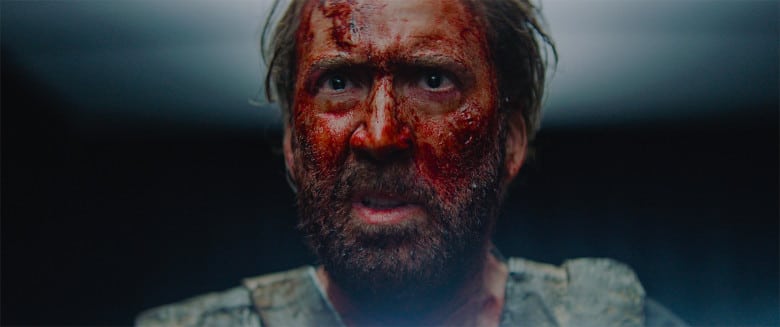Mandy, which is just Cosmatos’ sophomore (!) effort, is a deceptively simple revenge flick, about a man who gets his life ripped and torn to shreds, by a maniacal cult, and a few hellhounds, and then hunts and kills them, in revenge. Think of it as, the bastard lovechild of Ghajini and Mad Max.
I’ll admit, that premise doesn’t sound like much, but the method to the madness, of Mandy, is the execution. Cosmatos’ direction and Benjamin Loeb’s cinematography are leaps and bounds beyond any modern filmmaker’s (obvious exceptions being Nolan, Villeneuve, the Coens, the usual suspects). Cosmatos’ previous effort, Beyond the Black Rainbow (I hope Mandy brings attention to it, the way Pulp Fiction did to Reservoir Dogs), was an aesthetically interesting film, with great cinematography, sound design, and a soundtrack that ranks high among modern horror/sci-fi soundtracks. But it squandered what was a genuinely unique, and interesting, premise for the aforementioned aesthetic choices, with slow editing, a rather obtuse script, and an ending that left quite a few aspects open-ended, it didn’t reach its full potential, which, I feel, was a shame.
Thankfully, it looks like Cosmatos learned from that, and delivered in Mandy, a film that meets all the hype that was generated, by its gripping trailer, and then some.
I’d love to point out, the acting on display. The whole cast is bringing their A-game to the table, led by the living breathing paradox, that is Nicolas Cage. The man has been in some absolute stinkers (Left Behind), but he’s also been in some great films (Face/Off), in movies that are so bad that they’re good (The Wicker Man), and in guilty pleasure schlock (National Treasure). Thankfully, Mandy falls under the great films category, and Nicolas Cage unleashes his acting skills. He has relatively few lines, as opposed to the antagonist, but he conveys SO MUCH, through his emotions, and facial expressions. There’s a truly meme-able moment in the film, where he storms into a bathroom and loses himself while swigging down vodka. It’s a scene that’s destined to be a meme classic and a new addition to the Nic Cage freakout montages. Yes, the events leading up to that scene are tragic, and horrifying, but come on. It’s a Nic Cage freakout scene. It’s destined for cult status.
Aside from Cage, the other memorable performance is of Linus Roache’s, who plays the antagonist, Jeremiah Sand, a Charles Manson-esque personality, who is the leader of a Catholic cult, and who plays a key part in the unfolding of the events of the movie. His slippery, disgusting, eerie, shocking, turn as Sand is one for the history books, as Roache gives everything he has, in making the character as despicable as humanly possible. Best Supporting Actor nod? Maybe. Just maybe.
This is not to take away anything from Andrea Riseborough, who plays the eponymous character. She is mysterious, seductive, and a rather coy, character, who plays an extremely pivotal role in the second half of the movie. To say anything else would be venturing into spoiler territory, so I’ll leave it up to you to see what happens.
Casting aside, the cinematography deserves a special mention. Benjamin Loeb sets a rather high standard, with jaw-dropping vistas, and vivid colours, which bring to mind Dario Argento’s horror masterpiece, Suspiria. There is one shot, in particular, of the night sky, that made my already dropped jaw, drop a little more, because of how beautiful that shot was. I’m telling you, the movie is chock full of such shots, and it must be experienced on the biggest screen, with the loudest sound, which is why it’s a bloody shame it isn’t getting a wide theatrical release. It does tend to have a few shots that linger a little too long, which will irritate a few viewers. Primary colours seem to be the colour scheme, and Loeb does a bang-up job in bringing the best of those colours out. The movie is a visual treat to behold. The sound editing too is on point, which brings me to my next, and possibly the most special, aspect, of the movie.
Mandy was one of Johann Johannson’s last scores, which he composed before his tragically untimely death. The man was a genius; an Oscar nominee, with an impressive résumé, which consisted of greats like Sicario, Prisoners, The Theory of Everything, and my personal favourite, Arrival. Beyond the Black Rainbow had an impressive soundtrack, but Mandy looks to usurp the throne, from it. Johannson’s synth-washed score, with heavy metal guitars, and ambient noise which only add to the impending doom, is an aural gem. The score ranges from sweet, to sinister, and even outright badass and awesome, with the distorted guitars and heavy metal instrumentation. This has got to be one of the best horror movie scores ever composed. And may Johann rest in peace.
To bring it all home together, Mandy is a visceral thrill ride. It isn’t a movie; it’s an experience. It is the kind of movie that just doesn’t get made anymore. A movie that takes risks, and succeeds at what it sets out to do. It is, by far, the best original movie of the year. And a definite must watch for horror junkies, gore fiends, and movie connoisseurs in general. The movie is a horrifying acid trip in the first hour, and a (literally) blood-soaked, over the top, ultraviolent, extravaganza, in the second. To anyone who still isn’t convinced, there’s a chainsaw duel in the movie. Need I say more?
Rating: 4.5/5

